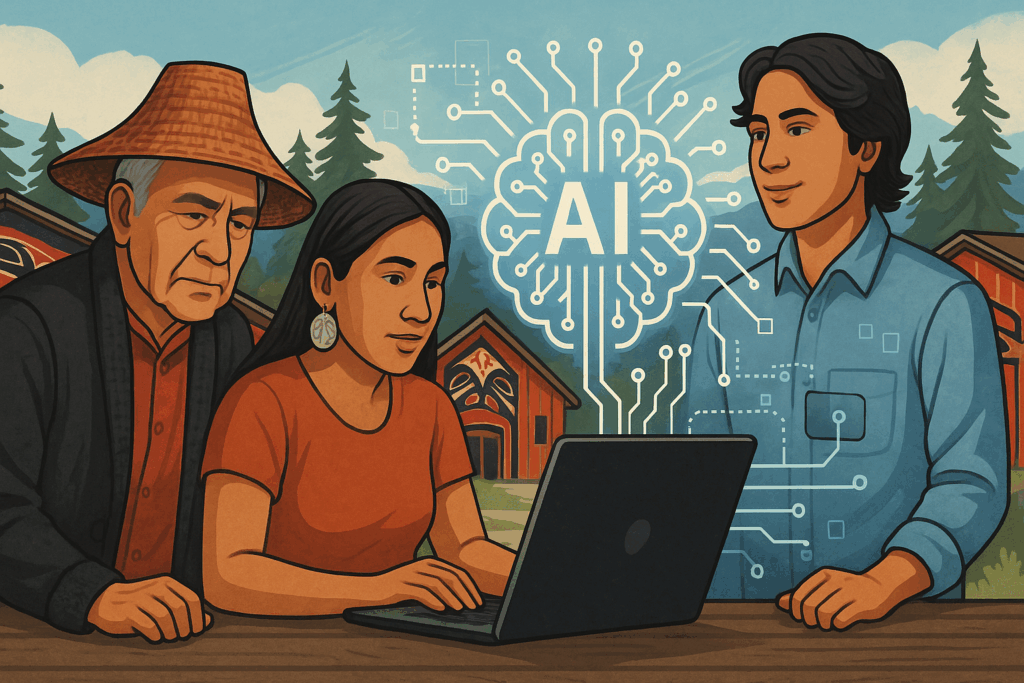

Words by Natiea Vinson, CEO of First Nations Technology Council and member of Canada's Advisory Council on Artificial Intelligence.
Canada is making a major investment in AI, with a proposed $2.4 billion aimed at driving innovation. While this has the potential to bring economic growth—potentially boosting the economy by $230 billion— we have to ask: Who will truly benefit from AI advancements, and who risks being left behind?
The risk of digital colonialism is real.
AI systems are built on Western frameworks that do not necessarily reflect or serve Indigenous community needs. These systems continue the erasure of Indigenous knowledge, values, and governance models, reinforcing the urgency for an approach to AI that is ethical and grounded in Indigenous rights.
As the Canadian government moves forward with a $2.4 billion investment in AI, the technology is advancing faster than efforts to ensure equitable access and oversight. AI development must prioritize digital sovereignty—a fundamental right for First Nations communities—where data governance, privacy, and technological control remain in the hands of Indigenous Peoples. Without this, AI will not close existing social and economic gaps; it will deepen them.
AI models often fail to respect Indigenous governance practices such as consensus-based decision-making or clan systems.
AI should not be limited to linear, reductionist logic. It must reflect Indigenous knowledge systems that have sustained communities for generations. When AI is developed without meaningful First Nations input, it risks undermining the very communities it should support.
This is not just about access—it’s about representation, governance, and sovereignty. AI must be intentionally shaped to strengthen, rather than exclude, First Nations communities. Its potential as a tool for digital empowerment is immense, but realizing that potential requires design processes led by and for Indigenous Peoples from the start.
AI must serve all communities, and Indigenous voices must be central to its development.
As Canada moves forward in AI development, First Nations must not be left behind. Every technological advancement should be an opportunity for empowerment, not another step toward exclusion. AI must be shaped in ways that reflect and respect Indigenous governance, knowledge, and priorities.
Meaningful engagement with First Nations in AI goes beyond consultation—it requires genuine collaboration, research partnerships, and respect for Indigenous intellectual property and data governance. AI has the potential to support Nation-building, governance, language preservation, and economic development, but only when First Nations leadership guides its design and implementation.
AI has the potential to support Nation-building, governance, language preservation, and economic development, but only when First Nations leadership guides its design and implementation.
At the same time, First Nations must be active participants in shaping AI to serve our communities. When used with intention, AI can be a powerful tool for self-determination, economic growth, and cultural preservation. By taking the lead in AI adoption, First Nations can harness its potential rather than be left to navigate systems built without us.
At this critical moment, the First Nations Technology Council is actively working to support First Nations in navigating AI adoption through our new initiative, Enabling AI Adoption for First Nations in BC. We are currently gathering priorities and goals from elected officials and staff of First Nations across the province. These insights will inform the development of custom AI resources to support Nation-building.
Want to learn more? Read “The Politics And The Perils Of AI: Exacerbating Social Divides in Canada”, in Forbes, featuring contributions from Natiea Vinson, CEO of the First Nations Technology Council.
Natiea Vinson was recently appointed to the Government of Canada’s Advisory Council on Artificial Intelligence.